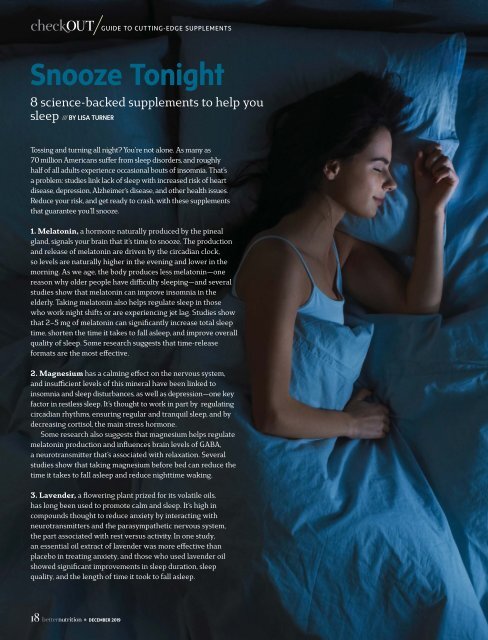Create successful ePaper yourself
Turn your PDF publications into a flip-book with our unique Google optimized e-Paper software.
checkOUT/GUIDE TO CUTTING-EDGE SUPPLEMENTS<br />
Snooze Tonight<br />
8 science-backed supplements to help you<br />
sleep /// BY LISA TURNER<br />
Tossing and turning all night? You’re not alone. As many as<br />
70 million Americans suffer from sleep disorders, and roughly<br />
half of all adults experience occasional bouts of insomnia. That’s<br />
a problem: studies link lack of sleep with increased risk of heart<br />
disease, depression, Alzheimer’s disease, and other health issues.<br />
Reduce your risk, and get ready to crash, with these supplements<br />
that guarantee you’ll snooze.<br />
1. Melatonin, a hormone naturally produced by the pineal<br />
gland, signals your brain that it’s time to snooze. The production<br />
and release of melatonin are driven by the circadian clock,<br />
so levels are naturally higher in the evening and lower in the<br />
morning. As we age, the body produces less melatonin—one<br />
reason why older people have difficulty sleeping—and several<br />
studies show that melatonin can improve insomnia in the<br />
elderly. Taking melatonin also helps regulate sleep in those<br />
who work night shifts or are experiencing jet lag. Studies show<br />
that 2–5 mg of melatonin can significantly increase total sleep<br />
time, shorten the time it takes to fall asleep, and improve overall<br />
quality of sleep. Some research suggests that time-release<br />
formats are the most effective.<br />
2. Magnesium has a calming effect on the nervous system,<br />
and insufficient levels of this mineral have been linked to<br />
insomnia and sleep disturbances, as well as depression—one key<br />
factor in restless sleep. It’s thought to work in part by regulating<br />
circadian rhythms, ensuring regular and tranquil sleep, and by<br />
decreasing cortisol, the main stress hormone.<br />
Some research also suggests that magnesium helps regulate<br />
melatonin production and influences brain levels of GABA,<br />
a neurotransmitter that’s associated with relaxation. Several<br />
studies show that taking magnesium before bed can reduce the<br />
time it takes to fall asleep and reduce nighttime waking.<br />
3. Lavender, a flowering plant prized for its volatile oils,<br />
has long been used to promote calm and sleep. It’s high in<br />
compounds thought to reduce anxiety by interacting with<br />
neurotransmitters and the parasympathetic nervous system,<br />
the part associated with rest versus activity. In one study,<br />
an essential oil extract of lavender was more effective than<br />
placebo in treating anxiety, and those who used lavender oil<br />
showed significant improvements in sleep duration, sleep<br />
quality, and the length of time it took to fall asleep.<br />
18 • DECEMBER <strong>2019</strong>

















